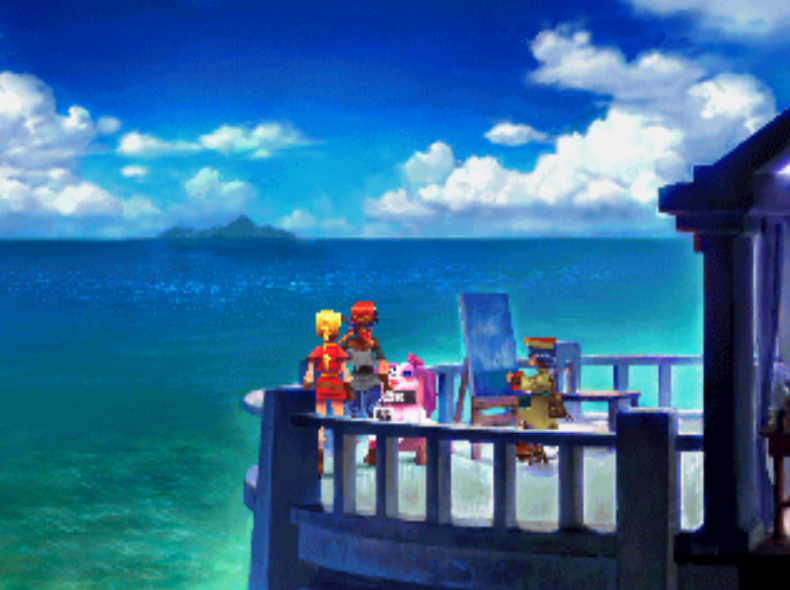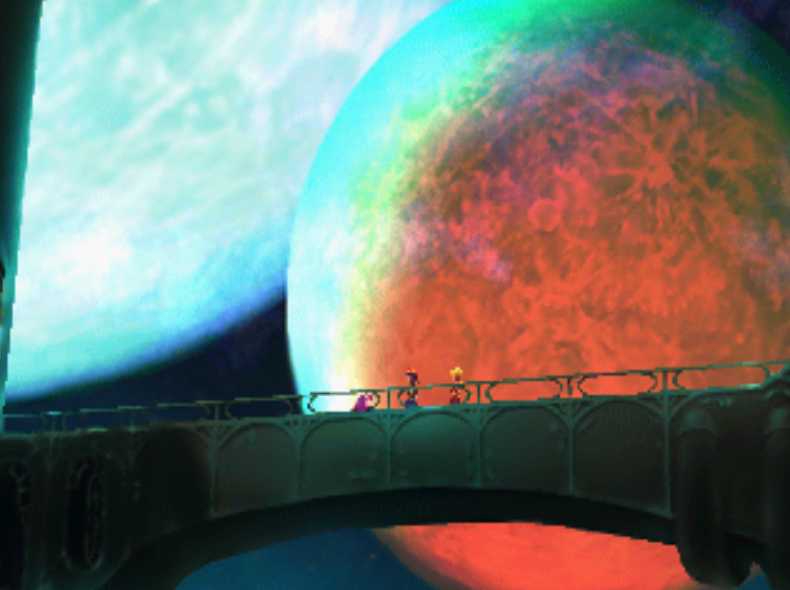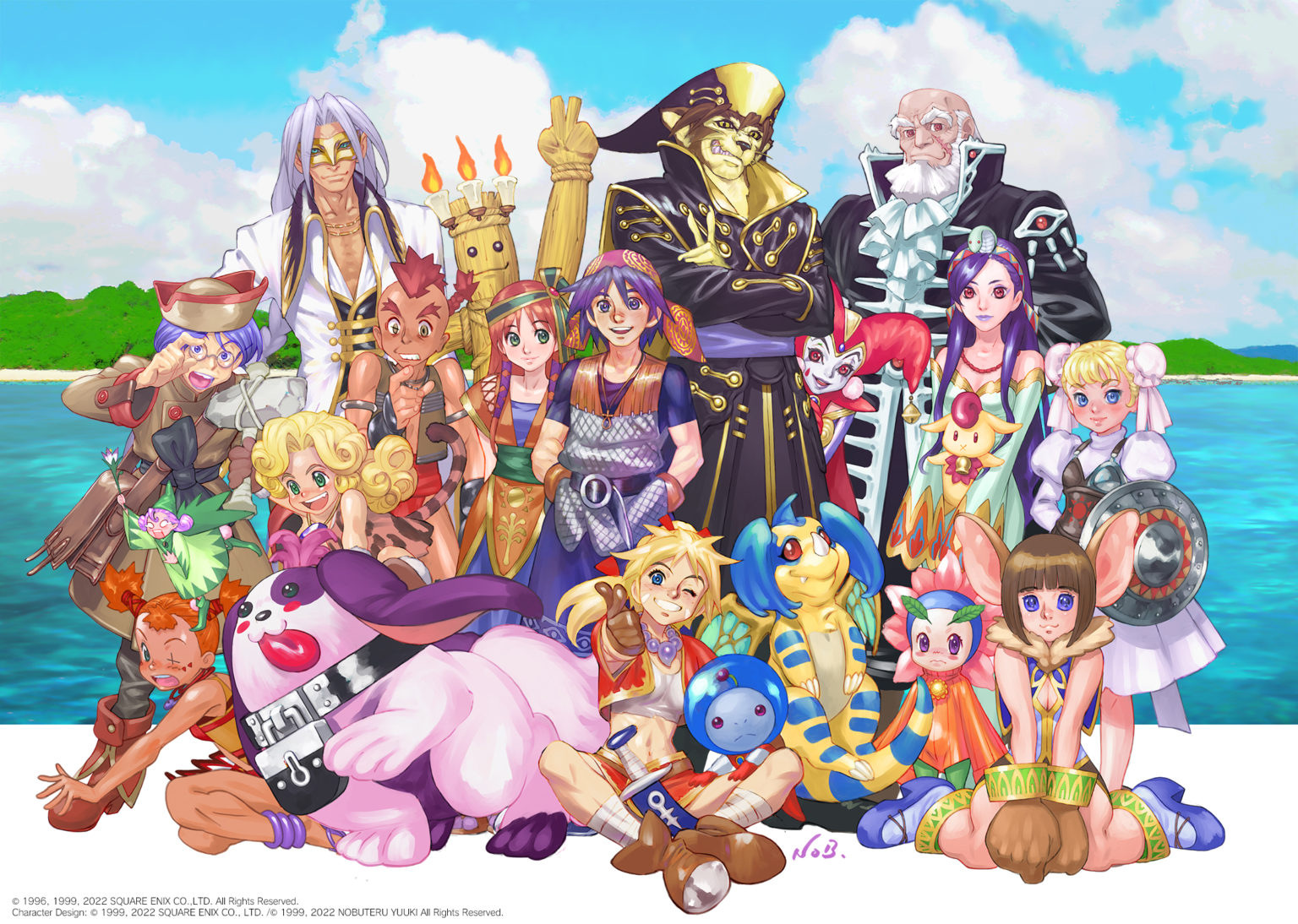Leveling up Together: a Unique Approach from a Polarizing Game
Written by Rubin on Monday, June 13th, 2022Before I begin this proper, I want to say hello, and welcome to the Tsuchinoko Report! This section of the site serves as a place for me to collect my thoughts on video games and other media, and spit them out in a semi-reasonable manner. Though I may offer critique from time to time, the main goal of the Tsuchinoko Report is to analyze what I enjoy about the media in question and, given my background as a TTRPG dev, what might inspire me in future forays into building games.
As for the game in question — we'll be talking about Chrono Cross, the hit-or-miss sequel that was recently released for the Switch. Hilariously, I actually didn't play the game in question on the Switch. In fact, I had been about halfway through my trek though the PS1 version of the game when I heard the news, but figured it better to stick with what I had been playing.


Now, why is Chrono Cross a hit-or-miss? On the miss, just about every person I know who's played Chrono Trigger has criticized it for...well, not being Chrono Trigger. The ATB battle system isn't quite present, the level of engagement with party varies wildly from character to character, and to top it off, the ending of the game...well, without getting into it too much, I can certainly see why a lot of folks might have Opinions (tm) on the matter.
However, on the hit — especially if you're not expecting Chrono Trigger — Chrono Cross does a lot of adventurous design decisions that personally, I found fresh and engaging, even if not all of them quite hit the marks they may have wanted. Notably, we're going to talk about why the party engagement is so varied: and that's because, yes, Chrono Cross has over forty recruitable characters.
In RPGs where characters can be swapped out for different party members, the question of handling levels is an important question that has been answered in various ways. Some games, like the game I'm currently going through, Dragon Quest 11, shares exp among all characters, regardless of whether or not they're in the party. Another game that I finished this year, Digital Devil Saga, only gives exp to your current party by default. If, by chance, you wanted to level up the characters in wait, you'd need to invest in unlocking a particular skill — and only when you equip that skill will that character gain exp alongside your party. And going a step further, some game's don't even offer the chance to train out-of-party members at all, making which characters you chose for your party a very important decision.
Now, what about Chrono Cross?
Well, Chrono Cross, being how it is with most things, throws that concept out the window promptly. In Chrono Cross, no one has a Level. Instead, every character — even the ones you haven't recruited — have stats relative to the group's "Star Level," a unique value that is carried throughout the entire game.
At the start of Chrono Cross, your Star Level is basically nonexistent. And like most RPGs, there isn't much that explains why it exists — just that you have a Star Level, and when you Save the game, it's recorded alongside your Playtime and current party.
However, as you progress the tale and fight pivotal bosses, your Star Level improves, highlighting that you've met an important 'checkmark' on your journey. And when you gain that Star, everyone, regardless as to whether or not they're in the party, or even recruited as a whole, collectively 'Level Up' in the background. These predetermined Level Ups generally are built around each of the characters, too — so the peppy, faithful Dog Poshul is bound to get Strength and HP more often than, for example, the much more magically inclined Riddel or Harle.
Interestingly, the only exception to these predetermined Level Ups is if, after defeating the enemy in question, your gain a Star while one of your party members are KO'd. In this instance, that KO'd party member doesn't gain any stats — but, given the game's additional 'mini-level ups' they provide to the main party to increase their stats further after a certain number of generic battles, the it's likely that party member isn't missing out on too much.
Another thing of note, however, is that alongside Stats, the current Star Level universally effects two things: what skills each character has access to, and how many elements they can equip to their Board. Without going into too much detail on boards, every character can be customized to equip a number of 'elements', or skills, based on their boards — some users have bigger boards than others, but overall, will only be so big or small based on the Star Level the group currently has.
The character's unique skills — gained at 3 and 15 Star Levels, then either at about 25-40 stars or through a unique story event — also means that depending on where you are in the story, you'll only have so many tools in your arsenal. This can make some of the battles difficult, even punishing, based on which characters you bring along to fight and, depending on who you've recruited, serves as an opportunity to try and change things up in order to get an edge in the upcoming fight.
All in all, the way Chrono Cross handled their massive cast worked surprisingly well, at least from a mechanical standpoint. There's still, by the nature of having such a large number of characters, those who shine better than others. Some party members have far bigger boards than others, giving them more elements to cast on the field. Others, such as the mysterious shapeshifter Sprigg, simply have more interesting and unique mechanics tied to them — leaving many of the others feeling 'samey.' And of the ones that have nothing particularly exciting to set them apart, certain characters, usually those with a bit more of lore tied to them, simply have better stat spreads.

Still, there's something to be said about Star Levels. Based on when you get them and why, Chrono Cross has done something that might be familiar to TTRPGs — namely, the idea of Milestones. Though there are some TTRPGs where you calculate exp after every combat, many GMs choose to reward players with Level Ups and other important features, items, and so on when an important story point is met. These Milestones help players guide themself through the journey, and whenever they do gain one, know that whatever they're doing or wherever they're going, they're doing something right.
Maybe that's why I had taken a liking to Star Levels. In such a niche, polarizing game, this mechanic had felt new, yet easy to understand. There was never a time in Chrono Cross where I felt the need to grind — well, at least not for mini levels, anyway — only an understanding that, based on the tools that I had, I'd need to work out a solution with what I had. It's so different than many RPGs I was used to, where who you decided to level up in your party meant benching someone for the game. Chrono Cross always gives you the option to switch up your party, to explore new characters, and try new options. Now, if only equipping each character's board wasn't so painstaking towards the end of the game...
If you ever find yourself wanting to play Chrono Cross, my recommendation for it stands that you should go into it without Chrono Trigger in mind. Save for the almost hammy inserts they put towards the end — whether it was a time crunch, running out of budget, or poor writing, beats me — the unique, sometimes questionable gameplay definitely warrants a playthrough.